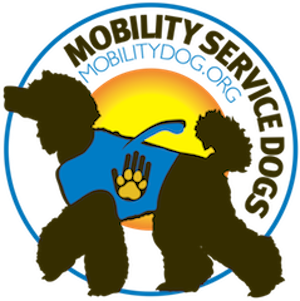What Does Your Dog Mean to You?
MobilityDog’s Founder, Janie Henrich and her Mobility Service Dog
Dog-human relationships can be cast in many lights. Some connections are healthy and mutually beneficial, others exploitive and cruel. Below are a few ways Canis lupus familiaris and homo sapiens relate to one another.
Dogs as Property
Those of us who love our pooches hate to be reminded that sometimes people treat dogs as property – slaves, really – often with terrible consequences. Fighting pit bulls bred only to tear each other apart and be discarded when they lose a battle is one horrific example. Breeders whose females are kept in cramped enclosures and used for nothing more than producing litter after litter is another. Human slavery was outlawed long ago (although some forms still exist), but dog slavery is still with us.
Man with Service Dog In Training
Dogs as Employees
We could look at working dogs as employees of a human manager. Sled dogs, herding dogs, hunting dogs and guard dogs play these roles. As in a conventional employer-employee relationship, employee-dogs may:
Receive training to do their jobs well.
Perform work that is often fulfilling (but not always).
Receive correction or criticism when their performance falls short.
Get a reward for doing the job well.
In effect, the dog and the human make a deal: the dog executes agreed-upon tasks, and the human provides compensation in the form of praise, care and affection. Unfortunately for dogs, they can’t easily quit their jobs and they don’t have union representation (though occasionally they appear to go on strike).
Dogs as Children
It’s not uncommon to hear someone refer to a dog as “my four-legged child,” and a dog’s owner as a “dog parent.” Certainly, some owners infantilize their pets, throwing them birthday parties and dressing them up for holidays (dogs outfitted as pumpkins, lions or dinosaurs are common sights at Halloween). And a canine in the household can surely demand nearly as much attention as a toddler. Ultimately, however, dogs and humans don’t cross species lines. We don’t share DNA, we don’t groom them for independent success in the outside world and we (usually) don’t consider them to be prospective recipients of a financial legacy. Dogs aren’t human, after all, no matter how much some of us wish they were.
Dogs as Accessories
Sometimes, people treat their dogs as fashion items, accessories that make a statement about an individual’s social status or desired public persona. The now-famous image of a Chihuahua toted about in an expensive handbag, the French Bulldog wearing a tartan vest, the Pit Bull with a spiked collar – are all examples of using a dog to make a public pronouncement about personal style. As long as the dog is not harmed, do we care? We don’t think dogs feel embarrassment, but we don’t know for sure.
Service Dog Team Brady And Yogi
Dogs as Friends
When we refer to our pets as “companion animals,” we place them in the category of “friend.“ Dogs are pack animals, and we become part of their packs, as they become part of ours. We can observe their discomfort when a member of the pack is missing. We love them, and we believe they reciprocate our love. (Or have they just learned from cats how to manipulate our affections? Hmmm … ) In any case, as with human friendships, our relationship with our canine buddies relies on trust, the ability to predict another’s behavior and count on the other to act in our best interest. The mutuality of friendship is clear between owners who love their pets and pets who (at least act as if they) love their owners in return.
Ethical Responsibilities
With the exception of dogs-as-property, each of these relationships confers upon us a set of ethical responsibilities. We take on the obligation not just to provide the minimum requirements for safety and survival, but also to give our pets a life that meets the deeper needs of animals that, while not human, are clearly sentient beings. How we craft our relationships with our pooches and how we live up to our responsibilities require us not to just be conscientious owners, but also to be good humans.
All Images Courtesy of MobilityDog.org.
Check out this article for a wide-ranging discussion of human-dog relationships: Hens, K., “Ethical Responsibilities Towards Dogs: An Inquiry into the Dog–Human Relationship,” J Agric Environ Ethics DOI 10.1007/s10806-008-9120-y.



